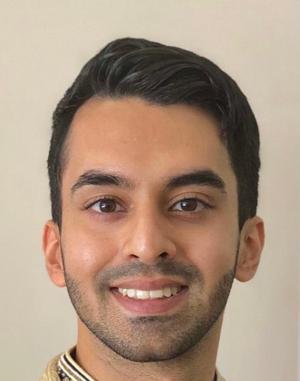Dr Manas Dave, Oral and Maxillofacial Pathologist
If you're someone who is fascinated by the intricacies of disease, from the cellular level to how it affects the whole person, then pathology might just be your calling.
Can you tell us what oral and maxillofacial pathology is?

When I first stepped into the world of pathology, I was captivated by how tissues from every corner of the human body can tell a story under the microscope. Oral and maxillofacial pathology focuses on the tissues of the head and neck. From small biopsies of oral tissues to extensive cancer resections of the larynx or facial structures, we delve deep into understanding diseases that impact functions like speech, swallowing, and appearance.
In oral and maxillofacial pathology, I spend my days examining these tissues, searching for clues that will lead to a diagnosis. It's a bit like being a detective, piecing together evidence from cells and structures to help guide patient care. For those intrigued by this field, there are pathways for both medically and dentally qualified individuals. Coming from a dental background myself, I am in specialty training tailored for dentists. Organisations such as the British Society for Oral and Maxillofacial Pathology offer great resources for anyone curious about this pathology.
Can you tell us about your average working day?
An average day feels like a blend of detective work, report writing, and teamwork. Each morning, I gather a tray filled with glass slides and patient request forms. Every slide represents a unique story, a patient's journey, and it's my role to uncover what's happening at a microscopic level. Peering through the microscope, I navigate a vibrant world of cells and tissues, looking for patterns and anomalies that could explain a patient's symptoms.
Before these slides reach me, there's a highly intricate process that brings them to life. It starts with "cut up," where specimens are carefully examined and prepared. This could range from small biopsies that need delicate handling to large surgical resections involving multiple facial structures (and sometimes hundreds of slides!). Understanding the anatomy and surgical context is crucial; we need to ensure we're examining the correct areas, such as tumour margins, to provide accurate information back to the clinical team. This is where the head and neck anatomy knowledge I learned in dentistry is very useful.
One of the highlights of my week is the multi-disciplinary team (MDT) meeting. It’s a room with oncologists, surgeons, radiologists, nurses, and fellow pathologists amongst others, all collaborating to discuss patient cases. It's here that we share our findings, discuss treatment options, and combine our expertise to chart the best course forward for each patient.
Despite the time I spend at the microscope, pathology is far from a solitary profession. We often consult with colleagues, double-check diagnoses, and even gather around a multi-headed microscope (which lets several of us view the same slide simultaneously). The collective problem-solving makes even the most challenging cases rewarding.
Why did you choose this specialty?
My journey into oral and maxillofacial pathology was profoundly shaped by a personal experience. Just as I was preparing to embark on my dentistry studies at university, my mother discovered a lump near her jaw. Initially dismissed as a swollen lymph node, it soon became apparent that it was something more serious—a tumour in the parotid salivary gland. The uncertainty and fear during that time opened my eyes to the critical role pathologists play in patient care.
Witnessing firsthand how a pathologist's diagnosis could determine the course of treatment was eye opening. It sparked a deep interest in the 'behind the scenes' aspects of medicine. During my dental studies, I decided to pursue an intercalated degree in pathology, and from the moment I looked down the microscope, I was hooked. The intricate details of tissues, the problem-solving involved in reaching a diagnosis, and the impact on patient outcomes resonated with me deeply. I've shared more about this journey in a blog post with the Royal College of Pathologists.
What do you enjoy most about your chosen specialty?
What I love most about oral and maxillofacial pathology is the unique intersection of clinical insight and microscopic exploration. Coming from a dental background, I appreciate the challenges clinicians face in obtaining oral biopsies and understand the profound impact that head and neck diseases can have on a person's quality of life. Being able to bridge that gap; translating microscopic findings into actionable information for the clinical team, is incredibly fulfilling.
Every day presents a new puzzle. Some cases are straightforward, while others require deep investigation, special stains, or molecular tests to unravel. The thrill of uncovering the underlying cause of a patient's condition and knowing that my work directly influences their treatment is immensely rewarding. It's a privilege to contribute to patient care in such a meaningful way, and the continuous learning keeps me engaged and passionate about what I do.
What advice would you give to students looking to enter your field?
If you're someone who is fascinated by the intricacies of disease, from the cellular level to how it affects the whole person, then pathology might just be your calling. My advice would be to immerse yourself in the field as much as possible. Reach out to local hospitals pathology departments and see if you can shadow a pathologist. Experiencing the workflow firsthand; seeing how we examine tissues, collaborate with clinicians, and contribute to patient care can be incredibly insightful.
Organisations like the British Society of Oral and Maxillofacial Pathology provide fantastic resources for networking and learning more about the specialty. We are a friendly group to approach! The training pathway involves national recruitment and is a five-year journey, with exams from the Royal College of Pathologists. It's a challenging pathway, but one filled with discovery and the opportunity to make a significant impact on patients' lives. We'd be thrilled to welcome enthusiastic and curious minds into the specialty!
